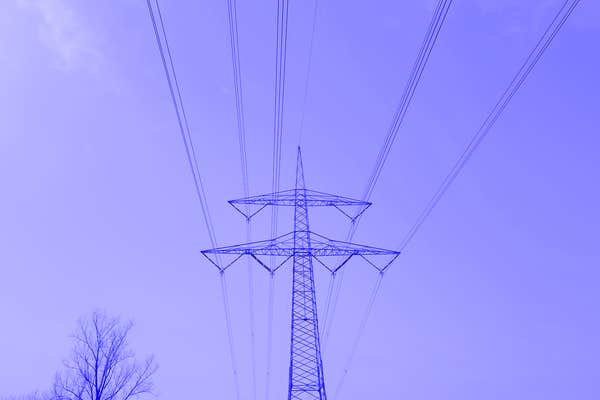
May 12th, 2025
Hey team, and welcome back to one5c! One of the jobs we take most seriously in our newsroom is filtering through the onslaught of climate headlines, week after week, so that we can deliver to y’all not only the most-actionable but also the highest-quality stories. But we also get that it’s a fact of our modern, hyperconnected life that you’re going to see way more than what passes through our filters.
So, we decided to share a bit of how our climate Spidey sense works, to help you feel more confident about sussing out who you can trust. Be sure to keep reading after this morning’s digest, because Audrey’s broken it all down. —Corinne
WHAT WE’RE INTO THIS WEEK
By Sara Kiley Watson

Action alert
Call for a better, more resilient grid
No matter the energy source, nothing works without a reliable grid. Grid capacity needs to expand 57% by 2035 and at least 200% by 2050 to keep up with demand, but right now the growth rate is just 1% a year. Transmission lines are a big piece of that puzzle. Some states, including Wisconsin and Minnesota, are already on their way to getting policies on the books that spur buildout, but every state needs to do more. A new campaign from Climate Changemakers, a group that organizes phone banks and other outreach programs focuses on getting the attention of state legislators, governors, and public utility commissions to build more transmission lines along highways in the U.S. Joining their latest Action Plan requires little more than getting informed (they’ve made that super simple with this issue briefing) and then getting on the phone. You can even hop into one of their Hours of Action Zoom calls to be part of the community while you work.
Report card
‘Advanced recycling’ is a bunch of garbage
You don’t have to look far to find evidence that recycling isn’t an effective way to deal with the plastic crisis—despite decades-long campaigns from fossil fuel giants to convince us otherwise. Increasingly, they tout “advanced” recycling, also known as chemical recycling, as a new and better way to get rid of single-use junk. However, a new report from the Center for Climate Integrity has laid out the truth: Chemical recycling is a fraud. It doesn’t scale, it pollutes, and it does little (if anything) to reduce our need for more virgin plastic—which, lest we forget, is made from fossil fuels. The real solution, the authors note, is that companies have to produce less plastic. Full stop. And the most effective thing we can do as individuals to address plastic pollution is to refuse to buy into it. Here are our top tips for dialing back.
Accountability check
The cost of climate change disasters will go uncalculated
In 2024, the U.S. experienced 27 billion-dollar weather and climate disasters, racking up a total of $182.7 billion in damages. For the past 40-plus years, NOAA has been tallying these costs, but the Billion-Dollar Weather and Climate Disasters project is the latest to be hit by the Trump administration’s rollbacks of climate research. Taking stock of the damage from heat waves, cyclones, wildfires, and other extreme events is one of the key ways that people can connect the dots between the climate crisis and its impacts on communities, one scientist tells The Guardian. “This administration thinks that if they stop doing the work to identify climate change that climate change will go away,” congressman and former meteorologist Eric Sorensen wrote on X. All past reports and data, going back as far as 1980, will still be archived and available.
Greenwatch
Will the Dodgers finally drop Big Oil?
The Los Angeles Dodgers are the reigning World Series champions, but they have a less-than-lovely benefactor: Phillips 66. The $40 billion oil and gas company has faced criminal indictments over illicitly dumping oil and grease into the Los Angeles County sewer system. Still, Dodger Stadium is dotted with orange “76” signs synonymous with the fossil fuel giant’s sub-brand, Conoco. The team has faced calls to sever ties before, but the 2028 LA Olympics might spur a replay. An official bylaw in the Olympic Charter states that “advertising signs shall not be allowed in the stadia, venues, or other sports grounds.” This rule has reinvigorated campaigns to nix the ads, reports LegalPlanet—especially since the mayor has vowed to make the next Olympics sustainable, even promising a “no-car games” in the city infamous for gridlock.
Product Review
The best all-purpose cleaner
Our top solution ditches single-use plastic and a whole lotta water weight. Read the full review.

CONSUME THIS
How to spot climate reporting you can trust
By Audrey Chan

It’s easy for even the most informed reader to get lost in a flood of information about the climate crisis—especially when a decent chunk of it isn’t accurate. A new study published in the journal PLOS Climate highlights this problem: Analyzing 14 years of climate discussion on Reddit, the authors found that only 4% of in-post links and just 6.5% of comments actually pointed back to scientific sources. Instead, most online conversations favored references to mass media, newspapers, and social platforms, which can often lack nuance and drown out the core scientific data.
Addressing the climate crisis requires a public that understands the science and can separate facts from flashy headlines. But with misinformation running rampant and research often difficult to understand and hard to access, what’s a climate-conscious reader to do? Beef up your B.S. detector with a better understanding of how to spot trustworthy sourcing. Here, with the help of that study’s authors and other climate communication experts, we break down the signs of good—and not-so-good—sources.
Red flags
It relies on generative AI
Earlier this year, a Global Witness investigation found that greenwashing and “bothsidesism” were omnipresent in chatbots’ answers about climate. When researchers grilled OpenAI’s ChatGPT, Meta’s MetaAI, X’s Grok, and Google’s Gemini on the matter, they received positive narratives about Big Oil, with little to no mention of climate setbacks like BP’s retracted 2050 net-zero pledge. These bots also often place a lot of weight on fossil fuel companies’ mitigation efforts, despite overwhelming evidence of the companies’ outsized role in creating the problem.
It flips basic scientific consensus
It doesn’t matter if it’s a social media post, podcast, book, or news article, if a source flies against a scientific consensus—like the facts that human-caused climate change is happening or that the burning of fossil fuels is a primary culprit—it’s pretty much hogwash. While there is legitimate debate in the scientific community about what responses to climate change are most suitable, says Cassandra L.C. Troy, a journalism professor at the University of Illinois Urbana-Champaign, if a source denies the basics, it isn’t reliable.
It uses unattributed data
For Allison Agsten, inaugural director of USC’s Annenberg Center for Climate Journalism and Communication, data with no clear sourcing should always be approached with a healthy dose of skepticism. “If I am inclined to reshare, I do my due diligence,” she says. If you can’t hunt down the original source, it’s a sign to not repost that story.
It’s engineered to make you angry
Social media (and sometimes media in general) is more often motivated by clicks than accuracy, says Yelena Mejova, a co-author of the recent Reddit study. She adds that you should be especially wary if a message “makes you mad and gives you the urge to quickly reshare it.” When something does grab your attention, Troy says to take a moment and consider why. “Is it conspiratorial? Does it rely on shock and anger? Does it offer one simple explanation or solution for an incredibly complex issue?” she says. “If so, you should consider avoiding this particular source altogether.”
Green flags
It quotes academic experts in climate-related fields
A quick way to tell if a news article is trustworthy? Look at who they quote. Experts are reliable because they have gained deep knowledge about a topic through education, training, and/or work experience, says Troy. They can understand the scientific evidence and distill complex information. But just because someone has a Ph.D. in their bio doesn’t mean they’re right about everything. Someone may have expertise-informed views in one, but not all, areas. A well-respected nutritionist commenting on energy policy isn’t the same as a policy expert, notes Troy.
It is transparent and factual
Whenever NPR highlights a story about Google, good or bad, its reporters are quick to note that Google is a financial supporter of their organization. That transparency is vital. Trustworthy sources should be upfront about their backers—whether funding, memberships, or partnerships. If this information is vague or hard to find, it’s reason enough to question a source’s reliability. Kathryn Thier, a postdoctoral research fellow in the Center for Climate Change Communication at George Mason University, suggests always checking if an outlet discloses its funders and decision-makers. Good outlets have nothing to hide.
It’s recommended by people you trust
If you’re unsure about an outlet, it’s great practice to check a site like Media Bias Fact-Check (MBFC), which Mejova used in her study, to see how experts rate outlets’ bias, factual accuracy, and credibility. Other groups, such as the Society of Environmental Journalists and the Center for Climate Journalism and Communication offer vetted lists of mainstream and specialty environmental outlets.
Choose a couple trustworthy sources for news and then go to them rather than putting all your faith in having an algorithm bring noteworthy information to you, suggests Troy. “This could mean reading a couple news apps, listening to a couple podcasts, or watching a couple news segments regularly.” Bonus: A more streamlined media diet will likely equal a happier, better informed you.
MIC-DROP CLIMATE STAT
Two-thirds
The portion of new AI data centers being built in locations with already high levels of water stress, according to an analysis by Bloomberg. What can we do about it? Use AI as sparingly as possible.
Copyright © 2025 one5c. All rights reserved.
Logo design by Claudia De Almeida
Questions? Feedback? Contact the editors at one5c@one5c.com.
Our mailing address is:
3112 Windsor Rd, Ste A-391, Austin, TX 78703
